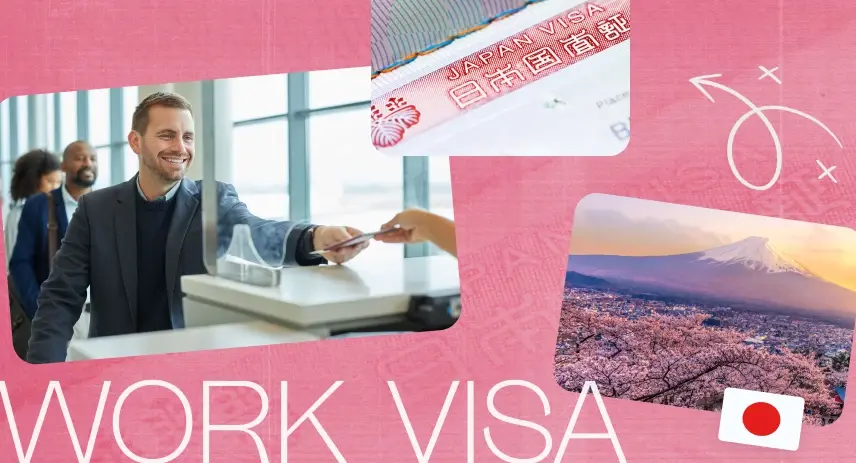Japan is a great choice for people looking to move abroad thanks to its unique culture, professional opportunities, and natural beauty. However, moving to Japan comes with challenges, such as securing the correct visa and navigating what, for many, is an entirely different way of life.
This guide will help you traverse the complexities of relocating to Japan. It’ll also help you know how to get there and what to expect after you arrive.
Things to know before moving to Japan
Moving to Japan is a life-changing experience. However, figuring out how to move to Japan from the United States or another country can be intimidating.
Consider the following points before you move to ensure you’re organized and know what to expect.
Authenticating and translating documents
Japan often requires official documents—such as birth certificates, marriage certificates, academic transcripts, or work contracts—to be translated into Japanese and authenticated.
This may involve:
- Getting an apostille from your home country. An apostille authenticates the government officials' signatures on documents you submit as part of the visa process to move to Japan.
- Using a certified translator familiar with legal Japanese.
- Providing notarized versions depending on the local municipality or immigration office.
Start early—some processes can take weeks or even months to complete, especially if you need embassy involvement.
Understanding housing costs
Housing in Japan, particularly in cities like Tokyo or Osaka, can be expensive and challenging to secure.
Key facts to know:
- Most landlords require an additional fee which may equal 1–2 months’ rent. Known locally as reikin or "gratitude money," this is a thank-you gift to a landlord for letting you rent their property.
- On top of the reikin, you’ll likely pay a security deposit, agent’s fee, and the first month’s rent upfront, totaling 2–6 months.
- Guarantors are typically required unless you use a guarantor company.
- Apartments are often rented unfurnished and without appliances like fridges or washing machines.
Use trusted English-speaking rental agencies that cater to people moving from elsewhere, or consider monthly serviced apartments while you get settled.
Learning Japanese basics
While you don’t need to be fluent, having some basic Japanese skills will help you navigate daily life more smoothly. A decent grasp of the language can also make moving to Japan a more enriching experience.
Consider learning:
- Greetings and politeness levels (e.g., ohayou gozaimasu, arigatou, sumimasen)
- Kanji for important signage, like entrance/exit, men/women, or emergency
- Basic phrases for shopping, public transport, and healthcare
Apps like Duolingo, LingoDeer, or Bunpo are great for beginners. Once you arrive, consider enrolling in a Japanese language class locally.
Cultural adaptation
Japanese culture values politeness, group harmony, punctuality, and indirect communication. Depending on where you’re from, this can make it hard to know how to live in Japan as a foreigner.
Common differences that may be an adjustment include:
- Shoes off in many indoor places (homes, schools, and some restaurants).
- Silence on public transport is expected. Taking lengthy phone calls in public or having informal conversations in elevators is frowned upon.
- No eating and walking at the same time. The Japanese finish a snack by standing somewhere before moving along.
- Gift-giving etiquette and bowing culture.
- Workplaces may follow strict hierarchies and emphasize formality.
Even if you're working remotely, learning these norms simplifies social interactions and avoids misunderstandings.
Healthcare in Japan
Japan has an excellent and affordable healthcare system. After moving to Japan, you must enroll in National Health Insurance (NHI) or Employee Health Insurance, depending on your visa and employment status.
- Japan bases NHI premiums on your income.
- You typically pay 30% of medical costs, and the government covers the rest.
- Dental care and mental health support are also accessible in the country but may differ in availability and approach based on your region.
It can be difficult finding clinics with English-speaking staff, so consider identifying international hospitals or English-friendly providers in advance. There are better times to practice your Japanese than when you’re trying to get a broken bone set.
Emergency numbers
Japan’s emergency services are reliable but the numbers differ from those of other countries. Keep these handy:
- 110 – Police
- 119 – Fire and ambulance
- #7119 – Non-emergency medical consultation (in some areas)
Some cities offer multilingual disaster-preparedness apps and guides. Earthquakes are an ever-present risk in Japan, so download local apps like Yurekuru Call or Japan Shelter Guide to stay informed.
What’s a digital nomad visa in Japan?
For remote workers moving to Japan, the country’s newly introduced digital nomad visa allows independent contractors and employees to live and work in the country temporarily—without needing to secure local employment or set up a business entity.
Launched in 2024, the visa is designed for high-earning foreign professionals employed by overseas companies or self-employed with international clients. It allows eligible applicants to stay in Japan for up to six months, offering a legal pathway to experience life in Japan while continuing to work remotely.
How much does it cost to move to Japan?
The cost of moving to Japan can vary widely depending on your lifestyle, your destination city, and whether you're relocating solo or with a family.
Here's a breakdown of some typical expenses.
Cost of living variation
Tokyo is Japan’s most expensive city. A one-bedroom apartment in central Tokyo may cost between ¥150,000–250,000/month ($1,000–1,700 USD). Outside the city center, that drops to around ¥80,000–140,000/month ($550–950 USD).
Kyoto or Fukuoka tend to be more affordable, with central apartments starting around ¥60,000–120,000/month ($400–850 USD).
Utilities (electricity, gas, water, internet) can add ¥10,000–25,000/month ($70–170 USD) depending on usage and apartment size.
Expect to spend around ¥40,000–60,000/month ($270–400 USD) on groceries and dining out per person depending, of course, on what you buy and how often you eat out.
Transportation
Public transport is reliable and extensive. A monthly commuter pass for the metro or trains in major cities like Tokyo can cost ¥10,000–20,000 ($70–140 USD), depending on the distance you select.
Nationwide travel is costly—consider a Japan Rail Pass if you plan to explore during your stay.
Other relocation costs
- Flights: One-way tickets to Japan from the United States or Europe typically cost $500–1,500 USD, depending on the season and departure city.
- Visa costs: Japan’s digital nomad visa is free or low-cost, but you’ll need proof of income and valid insurance. Some visa types may have modest processing fees.
- Temporary accommodation: Airbnbs or short-term rentals range from ¥9,000–12,000/night ($20–80 USD), but can be much higher in major cities like Tokyo.
- Shipping personal items: Sending a few boxes internationally via air or sea freight can cost between $300–2,000+ USD, depending on volume, origin, and speed.
In total, a single person relocating to Tokyo should expect to spend anywhere from $4,000–10,000 USD upfront, including the first month's rent, deposit (which is often 2–3 months' rent), travel, and setup costs.
Common types of visas for Japan
If you're planning on moving to Japan, you'll need the correct visa based on your purpose for staying. Here are the most common long-term visa options:
- Working visa. For professionals with a job offer in Japan, covering categories like engineering, teaching, and IT. The working visa requires a job offer from a Japanese employer, relevant qualifications, and a certificate of eligibility (COE).
- Student visa. For those enrolled in a Japanese university, language school, or vocational institution. The student visa requires proof of enrollment, financial stability, and a COE issued by the institution.
- Spouse visa. For individuals married to a Japanese citizen or permanent resident. The spouse visa requires a marriage certificate, proof of relationship, and a COE sponsored by the Japanese spouse.
- Startup visa. For entrepreneurs starting a business in Japan. The startup visa requires a business plan, financial resources, and local government approval.
- Highly skilled professional visa. For individuals with advanced degrees, high incomes, or specialized skills.The highly skilled professional visa requires a points-based evaluation, job offer, and COE.
Basic steps to apply for a visa in Japan
No matter what visa you choose, you’ll need to follow a few steps:
- Obtain a COE, which is typically arranged by your sponsor in Japan (employer, school, or spouse). It confirms that you meet the visa requirements.
- Apply for the visa at a Japanese embassy or consulate.
- Submit the COE, completed visa application form, passport, photo, and supporting documents.
- Receive your visa and enter Japan. Once approved, you'll receive a visa sticker in your passport. Upon arrival, you’ll get a residence card at the airport.
Processing times can vary but typically take a few months, depending on your visa type and situation. If you know you're moving to Japan, start the information gathering and visa process at least three months in advance.
Career opportunities in Japan
Japan offers strong career prospects in technology, automotive, education (especially English teaching), and healthcare industries.
Demand is high for bilingual professionals and skilled foreign workers. To find jobs, explore platforms like GaijinPot and Daijob, which specialize in roles for skilled migrants.
If you want to work remotely from Japan, Oyster’s Talent Network connects global professionals with remote-friendly employers.
Pros and cons of living in Japan
As with any relocation, there’s the ideal of moving to a new place versus the reality of living in a foreign country. Before relocating to Japan, consider the pros and cons of life there for newcomers.
Pros
High life-quality: Japan boasts high social cohesion, reliable public transportation, and low crime rates, all contributing to a comfortable lifestyle.
Healthcare: Japan has a universal healthcare system that provides high-quality care at relatively low out-of-pocket costs for residents.
Cleanliness: Cities and public spaces are remarkably clean, and there are strong cultural norms around tidiness, recycling, and respect for shared spaces.
Cons
Expensive living costs: Major cities like Tokyo and Yokohama can be expensive, especially for housing and going to restaurants and bars.
Strict social code: Knowing how to live in Japan can be challenging, since it’s tricky navigating new etiquette, hierarchy, and behavior rules and customs.
Language barriers: English isn’t widely spoken outside major urban centers, and many official processes require fluency in Japanese.
Build global teams and simplify relocation with Oyster
Oyster helps companies build global teams and retain top talent around the world. If a valued team member moves to Japan, Oyster makes it easy to retain that employee with our highly flexible EOR service. More generally, if you’re a company hiring global talent, Oyster helps you:
- Navigate visa and work permit requirements
- Ensure compliance with labor laws
- Handle payroll and benefits in accordance with local standards
Explore Oyster’s Talent Mobility solutions today.

About Oyster
Oyster is a global employment platform designed to enable visionary HR leaders to find, engage, pay, manage, develop, and take care of a thriving distributed workforce. Oyster lets growing companies give valued international team members the experience they deserve, without the usual headaches and expense.
Oyster enables hiring anywhere in the world—with reliable, compliant payroll, and great local benefits and perks.
.webp)





.webp)

.webp)

.avif)
.avif)
